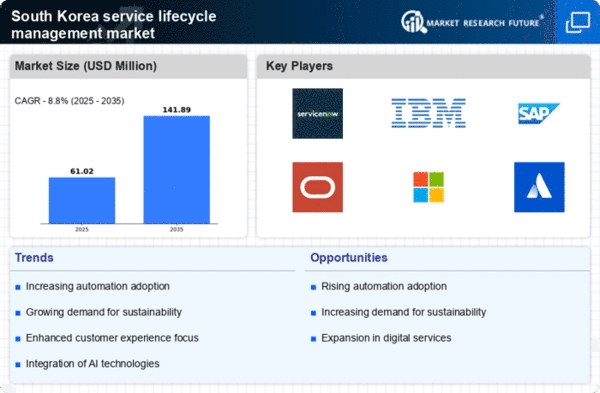Expansion of Cloud-Based Services
The expansion of cloud-based services is significantly impacting the service lifecycle-management market in South Korea. As organizations migrate to cloud platforms, they gain access to scalable and flexible service management solutions that can adapt to changing business needs. This transition is facilitating real-time data access and collaboration, which are essential for effective service delivery. Market forecasts indicate that the cloud segment is anticipated to grow by 35% over the next few years, driven by the increasing adoption of remote work and digital collaboration tools. Consequently, the service lifecycle-management market is likely to see a shift towards cloud-based solutions, enhancing operational efficiency and service quality.
Increased Focus on Sustainability
Sustainability has emerged as a critical driver in the service lifecycle-management market in South Korea. Organizations are increasingly prioritizing environmentally friendly practices and sustainable service delivery models. This shift is influenced by both regulatory pressures and consumer preferences for sustainable options. Companies that adopt sustainable practices are likely to enhance their brand reputation and customer loyalty. Recent studies suggest that businesses implementing sustainable service management practices can reduce operational costs by up to 25%. As sustainability becomes a core component of service strategies, the service lifecycle-management market is expected to evolve, with a growing emphasis on eco-friendly solutions.
Growing Importance of Data Analytics
Data analytics is becoming increasingly vital in the service lifecycle-management market in South Korea. Organizations are leveraging data-driven insights to enhance decision-making processes and improve service delivery outcomes. The ability to analyze customer data and service performance metrics allows businesses to identify trends and optimize their service strategies. Recent reports indicate that companies utilizing advanced data analytics can achieve a 20% improvement in service efficiency. As the demand for data-driven decision-making continues to rise, the service lifecycle-management market is expected to witness a significant transformation, with analytics playing a central role in shaping service management practices.
Rising Demand for Integrated Solutions
In South Korea, there is a growing demand for integrated solutions within the service lifecycle-management market. Organizations are increasingly seeking comprehensive platforms that can manage various aspects of service delivery, from planning to execution and monitoring. This trend is driven by the need for seamless communication and collaboration across departments, which can lead to improved service outcomes. Market analysis indicates that the integrated solutions segment is expected to account for approximately 40% of the total market share by 2026. As businesses recognize the value of holistic service management approaches, the demand for integrated solutions is likely to continue to rise, further propelling the service lifecycle-management market.
Technological Advancements in Automation
The service lifecycle-management market in South Korea is experiencing a surge due to rapid technological advancements in automation. Automation technologies, such as artificial intelligence and machine learning, are being integrated into service management processes, enhancing efficiency and reducing operational costs. This shift is expected to drive market growth, as organizations seek to streamline their service delivery and improve customer satisfaction. According to recent data, the adoption of automation in service management is projected to increase by 30% over the next five years. As companies leverage these technologies, they can optimize resource allocation and enhance service quality, positioning themselves competitively in the service lifecycle-management market.
















